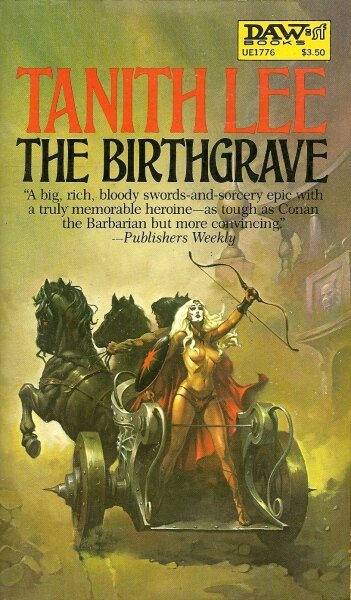Tanith Lee: Gone, But Not Forgotten
“Though we come and go, and pass into the shadows, where we leave behind us stories told – on paper, on the wings of butterflies, on the wind, on the hearts of others – there we are remembered, there we work magic and great change – passing on the fire like a torch – forever and forever. Till the sky falls, and all things are flawless and need… no words at all.” -- Tanith Lee
I tell ya, the month of May is hard on the titans. Frazetta, Vance, Dio, Haggard...and Tanith Lee. All died in the May of some year or another. Ms. Lee died five years ago after a battle with cancer.
Tanith Lee was a force to be reckoned with in the '70s, '80s and on into the '90s. She exploded onto the SFF scene with her debut novel for DAW Books, The Birthgrave. That book was labeled at the time as being "sword-and-sorcery". I would probably call it heroic fantasy, but it remains a minor classic regardless of specific sub-category.
During her forty-plus-year career, Tanith published ninety novels and a myriad of short stories. Her prolificity was on display right away. She quickly followed up The Birthgrave with more notable books like The Storm Lord and Volkhavaar, along with short stories like "Odds Against the Gods" published in Swords Against Darkness II, which is where I first encountered her work.
The UK edition of Night’s Master, with a cover by Melvyn Grant.
Just three years after the publication of The Birthgrave, Lee gave Night's Master to the world and launched her acclaimed "Tales From the Flat Earth" series. The setting, redolent of--apparent--influences ranging from Clark Ashton Smith to Lord Dunsany to The One Thousand and One Nights, is a masterpiece of dark fantasy world-building. The novels were also, quite likely, an influence on Gaiman's Sandman tales.
Here's the back cover blurb from the first edition of Night's Master:
“In those days the Earth was not a sphere and the demons dwelled in vast magical caverns beneath its surface. Wondrous cities dotted the land and strange peoples and fabulous beasts prowled the deserts and jungles of the world.
Supreme among those mighty demons was Azhrarn, the night's master. He it was whose pranks made nightmares on Earth, who brought desire and danger to those it amused him to visit, and who could grant wonders and create horrors unspeakable.”
As I said, Tanith was a force to be reckoned with in fantasy during this period. Sword and Sorcery author, Mark Taverna, has stated, "Tanith Lee is my favorite female fantasy writer." S&S scholar, Morgan Holmes, has said much the same thing in the past, as has John R. Fultz. Tanith Lee was stompin' the terra, back in the day. No other female author of heroic/dark fantasy even came close during that period.
As the '80s drew to a close, I slowly began to drift away from reading Tanith Lee's newer works. Apparently, that didn't stop her from forging ahead, writing a novel or two a year, along with numerous shorter tales. Oh, and winning several awards. All without my constant support.
How dare she.
The incomparable Tanith Lee.
Seriously, though, I should probably go back and check out "The Secret Books of Paradys" and "The Secret Books of Venus" and see how they read now. I already know that they will be technically beautiful to read. We'll just have to see if they're my glass of sapphire wine this time around.
I certainly can testify that Tanith kept writing quality short stories right up until the end. I bought Strindberg's Ghost Sonata and Other Uncollected Tales about a year ago and was quite impressed by several of the stories I found therein.
I've long said that Ms. Lee's writing--especially back in what I consider her prime, 1975 to 1985--could be described as varying portions of Lord Dunsany, Clark Ashton Smith and C.L. Moore. That's just shorthand for describing it to a prospective reader. Tanith Lee--who might not have been influenced much by any of those three authors--is absolutely her ownself. Nobody ever wrote like Tanith before or since. Her prose is lush and lavish and vivid, painting scenes with fire and shadow.
That said, Lee had the same knack for making a story sound like it was an ancient legend or an authentic fairy tale as Lord Dunsany…and you can bet Neil Gaiman was taking notes. She also possessed that sense of mordant and sardonic humor that one finds in some of Klarkash-Ton's best tales. Tanith's stories tended to be imbued with a certain femininity similar to what one finds in the fiction of C.L. Moore, but I think that Lee does Moore one better. I'll flat-out say it: I consider Tanith Lee superior to C.L. Moore (and I'm a fan of Moore).
Tanith Lee, five years gone. The world is a less interesting place without her.
The website devoted to Tanith Lee, Daughter of the Night, can be found here.



